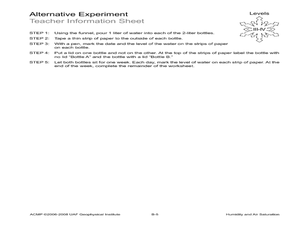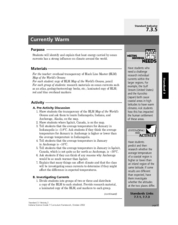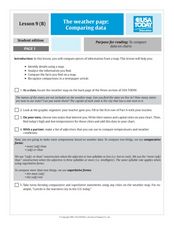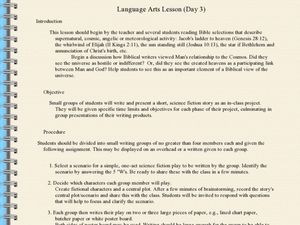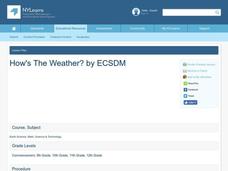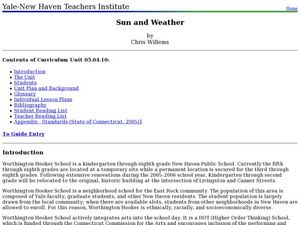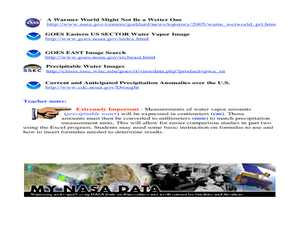Curated OER
Weaving Weather Maps with the World Wide Web
Students access the Internet and use real time data from the American Meteorological Society to create a detailed weather map. They make weather predictions based on the data collected.
Curated OER
Humidity and Air Saturation
Students experiment with air saturation. In this earth science instructional activity, students first complete an activity which teaches humidity. Then they use the scientific method to create their own experiments to test how long it...
Curated OER
Currently Warm
Seventh graders investigate how ocean currents affect climate. In this earth science lesson, 7th graders draw and label the current in their assigned ocean. They discuss how currents from the poles differ from the equator.
Curated OER
Weather or Not
Sixth graders explore weather. For this meteorology lesson, 6th graders create weather instruments and compare and contrast weather data.
Curated OER
Cloud and Weather Patterns
Fourth graders examine how weather patterns generally move from west to east across the United States, and how clouds are formed and are related to the water cycle. They view and discuss a PowerPoint presentation of the types of clouds,...
Curated OER
Adopt a City-Winter Weather
In weather worksheet, students use an on line site to collect weather data. They create 10 different weather scenarios using a temperature and humidity slider. They includethe temperature, relative humidity and weather conditions and...
Curated OER
Tracking a Hurricane
Students play the role of amateur meteorologists and track a hurricane. In this hurricane lesson, learners follow a hurricane by tracking its coordinates on an overhead map. Students work in small groups to place dots on the map showing...
Curated OER
The Weather Page-Comparing Data
Students examine weather patterns in the United States. In this weather lesson, students use a United States map to identify high and low temperatures in two states. Students compare the data and record their findings onto a chart.
Curated OER
Weather "Whys" Lesson 2 Seasons
Students explore seasons. In this cross curriculum weather and seasons instructional activity, students identify characteristics of the four seasons and sequence related pictures. Students listen to poems and stories about trees in...
Curated OER
Create a Pamphlet
Students explore weather conditions. In this weather investigation lesson, students use various search engines to list three facts about weather patterns, new vocabulary words, and a picture of a weather condition. Students use this...
Curated OER
Meteorologist for a Day
Students research weather patterns, predict the weather for a US city and write a weather forecast that be presented to the class. The forecast should explain their weather prediction and the weather patterns and conditions it is based on.
Curated OER
CYCLONES EXPLAINED
Students examine how tropical cyclones form and behave. They answer a variety of questions after examining specific pictures and figures regarding cyclones.
Curated OER
Bible Readings: Supernatural, Cosmic, Angelic, Meteorological
Students create and present a short science fiction story. In this Bible studies lesson students work in small groups and are assigned characters and a scenario to develop a play about.
Curated OER
How's the Weather?
Students explore earth science by researching the Internet. For this weather pattern lesson, students utilize the website weather.com to analyze the weather in different geographic locations. Students view charts and graphs based on...
Curated OER
Weather Patterns II
In this weather worksheet, middle schoolers use the diagram shown to explain what kinds of clouds form along the different types of air fronts. Then they describe what happens to the temperature when a particular front passes through....
Curated OER
Forecasting Weather
In this weather worksheet, students conduct an experiment where they record the weather observations for a week. Then they determine the air pressure using an aneroid barometer and estimate the amount of sky covered by clouds. Students...
Curated OER
Forecasting Weather
In this weather worksheet, students use a weather map to determine which station has the lowest and highest pressure. Then they describe the various types of fronts that can come through a location. Students also explain the difference...
Curated OER
Weather Prediction
For this weather worksheet, students review vocabulary words and concepts associated with predicting the weather. Students understand what a meteorologist studies. This worksheet has 7 matching, 10 fill in the blank, and 5 short answer...
Curated OER
Meteorology
Second graders identify and describe the three types of clouds. They discover the type of weather associated with each cloud type as well. They ask questions to complete the lesson.
Curated OER
Meteorology -- Clouds
Fourth graders examine the processes of condensation and evaporation. They identify the three types of clouds and state the weather that is possible with each type of cloud. They ask questions to end the lesson.
Curated OER
Cold Front Characteristics
Students study the weather conditions before, during, and after cold front passage. Two cold front examples are provided so that comparisons can be made. They are divided in two large groups. Each group studies a different cold front case.
Curated OER
Aspects of Weather
Students recognize and observe weather phenomena. In this four part weather lesson plan, students are introduced to weather symbols through a story, then use a thermometer to measure water temperature. Next, students observe the...
Curated OER
Sun and Weather
How is the Earth's weather created? Middle schoolers will explain how the Sun's energy is transformed into different forms. They will perform mathematical calculations of volume, mass, and temperature. They they will explain the...
Curated OER
A Comparison Study of Water Vapor Data to Precipitation over North America
Students use NASA satellite data to compare water vapor over the United States. In this data analysis lesson students use an Excel spreadsheet to map their data.



